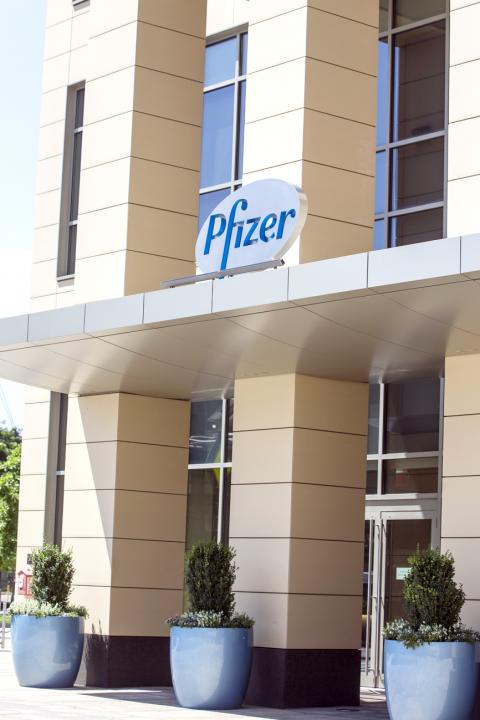Pfizer Inc is close to an agreement to buy Medivation Inc for about US$14 billion, people familiar with the situation said, the latest in a long run of blockbuster deals in the drug and biotechnology industries.
The deal could be announced as early as Monday next week, said the people, who asked not to be identified because the matter is still private. The biotech company’s shares closed at US$67.16 on Friday, giving it a market value of US$11.1 billion.
By acquiring Medivation, Pfizer would gain a blockbuster prostate-cancer treatment, Xtandi, that is already approved for sale in the US and elsewhere and that analysts project will generate US$1.33 billion in annual sales by 2020.

Photo: Bloomberg
Pfizer chief executive officer Ian Read said in May that he was more interested in acquiring late-stage assets because the company already had plenty of early-stage drugs in the works.
Pfizer spokeswoman Joan Campion declined to comment.
Medivation representatives did not immediately respond to telephone calls and e-mails requesting comment.
Pfizer has been relying on new branded treatments, including cancer drugs, to boost revenue, as sales of older medicines have slowed. In August, the New York-based company reported earnings that beat expectations after sales of breast cancer treatment Ibrance were better than analysts’ estimates.
A US$14 billion purchase of Medivation would be Pfizer’s biggest deal since buying Hospira Inc for about US$17 billion last year and the company is a rare prize.
As oncology becomes one of the hottest areas in drug development, large drug and biotechnology firms have found only a few mid-sized targets with revenue-generating, approved treatments.
Though Xtandi is a blockbuster, Pfizer will split US sales with Tokyo-based Astellas Pharma Inc, which partnered with Medivation on the drug.
Medivation also comes with two experimental products: a drug for breast cancer and another for the blood cancer lymphoma. The breast cancer drug belongs to a class of treatments known as PARP inhibitors, which disrupt cancer cells’ process of DNA repair.
The drug, talazoparib, could well be the most potent medicine in the PARP class, according to Katherine Xu, an analyst at William Blair & Co in New York, who estimates annual peak sales could reach US$3 billion.
By spurning Sanofi’s initial offer, valued at about US$9 billion, Medivation was able to bring in more potential suitors and drive up the bidding.
Gilead Sciences Inc, Celgene Corp and Amgen Inc were among the other drugmakers reported to consider the deal.
Medivation previously rejected French drugmaker Sanofi’s offer of US$58 a share, plus a contingent value right valued at a maximum of US$3 a share. The Financial Times reported earlier on Sunday that the Pfizer agreement was imminent.
The deal is a blow to Sanofi’s cancer ambitions. It has spent five months both courting and pressuring Medivation to reach a takeover agreement.
Sanofi chief executive officer Olivier Brandicourt might have pushed his case too aggressively. After Sanofi’s initial offer of US$52.50 a share was spurned, the Paris-based drugmaker chose to go straight to Medivation investors, seeking their support to oust the board.
Medivation warned of a “devil’s bargain” that would usher in new directors who might settle for a takeover price that was not in shareholders’ interest. Sanofi dropped the hostility last month as Medivation agreed to enter into confidentiality agreements.

Intel Corp chief executive officer Lip-Bu Tan (陳立武) is expected to meet with Taiwanese suppliers next month in conjunction with the opening of the Computex Taipei trade show, supply chain sources said on Monday. The visit, the first for Tan to Taiwan since assuming his new post last month, would be aimed at enhancing Intel’s ties with suppliers in Taiwan as he attempts to help turn around the struggling US chipmaker, the sources said. Tan is to hold a banquet to celebrate Intel’s 40-year presence in Taiwan before Computex opens on May 20 and invite dozens of Taiwanese suppliers to exchange views

Application-specific integrated circuit designer Faraday Technology Corp (智原) yesterday said that although revenue this quarter would decline 30 percent from last quarter, it retained its full-year forecast of revenue growth of 100 percent. The company attributed the quarterly drop to a slowdown in customers’ production of chips using Faraday’s advanced packaging technology. The company is still confident about its revenue growth this year, given its strong “design-win” — or the projects it won to help customers design their chips, Faraday president Steve Wang (王國雍) told an online earnings conference. “The design-win this year is better than we expected. We believe we will win

Chizuko Kimura has become the first female sushi chef in the world to win a Michelin star, fulfilling a promise she made to her dying husband to continue his legacy. The 54-year-old Japanese chef regained the Michelin star her late husband, Shunei Kimura, won three years ago for their Sushi Shunei restaurant in Paris. For Shunei Kimura, the star was a dream come true. However, the joy was short-lived. He died from cancer just three months later in June 2022. He was 65. The following year, the restaurant in the heart of Montmartre lost its star rating. Chizuko Kimura insisted that the new star is still down

While China’s leaders use their economic and political might to fight US President Donald Trump’s trade war “to the end,” its army of social media soldiers are embarking on a more humorous campaign online. Trump’s tariff blitz has seen Washington and Beijing impose eye-watering duties on imports from the other, fanning a standoff between the economic superpowers that has sparked global recession fears and sent markets into a tailspin. Trump says his policy is a response to years of being “ripped off” by other countries and aims to bring manufacturing to the US, forcing companies to employ US workers. However, China’s online warriors